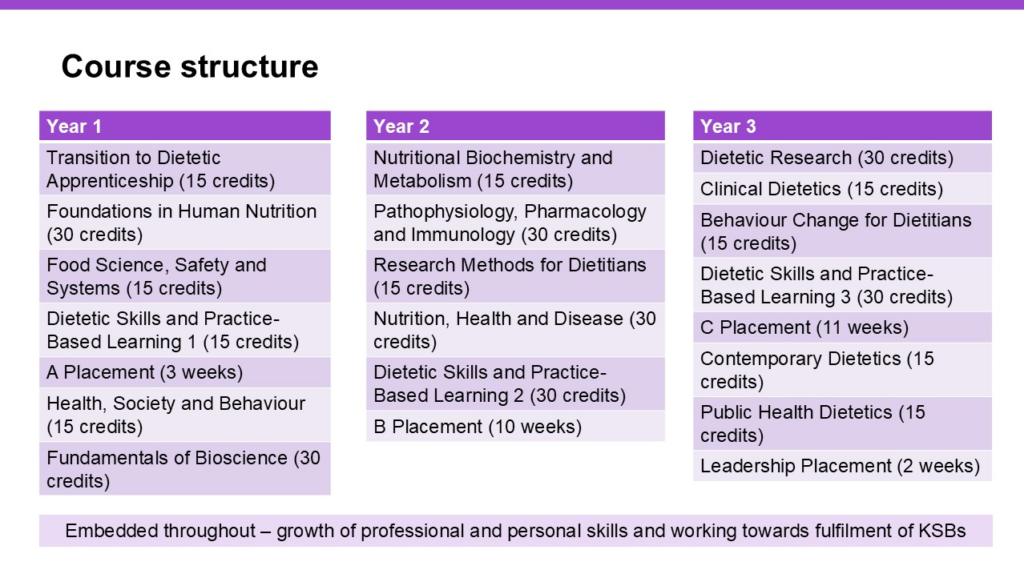Welcome to the Dietetics section of this online resource. Please take a moment to familiarise yourself with this programme, and don’t hesitate to get in touch with the Programme team for any queries.
Programme Intent
This programme aims to produce graduates who are equipped with the skills, knowledge and competencies to be adaptive and reflective practitioners who are ready to work in a complex environment. It aims to embed key skills for continuing dietetic practice into a long and fulfilling career, into whichever route the apprentice chooses to take in the future.
Implementation
The programme’s philosophy is to utilise a learner-centred approach that involves the apprentice actively in their learning. It also recognises the apprentice’s past experiences and their value and contribution to the learning process.
The programme’s learning and teaching philosophy is to incorporate case-based scenarios comprising interrelated contemporary subjects and act as a trigger for apprentices to discuss the intended learning outcomes and plan their strategy for achieving them. This integrated approach encourages the synthesis of knowledge, and facilitates both problem-solving skills and reflective skills, which lead to the development of apprentices’ ability to become autonomous practitioners.
The programme is designed to enable the graduate dietitian to be adaptable, to manage and be responsive to change in healthcare provision and to be able to work as part of a multidisciplinary team. It also encourages continuing professional development from the outset. The acquisition of the core dietetic knowledge and skills is facilitated through empowering the apprentice to be responsible for their learning.
Another key aspect of the programme is practice-based learning, comprising placements and simulation. This ensures that the learning outcomes align closely with what is needed in the workplace and encourages apprentice engagement. Apprentices are aware of what they need to do to improve, and practitioners are facilitated to support them. This process helps to ensure that apprentices can demonstrate their ability to work in an increasingly complex healthcare environment.
Impact
The programme affords learners the opportunity to fulfil the competencies required for eligibility to apply for registration as Dietitians with the Health and Care Professions Council (HCPC) and to become members of the British Dietetic Association (BDA). The programme aligns with all required benchmarks and standards including those related to the degree apprenticeship.
The rationale is for an integrated programme whereby theory informs practice and practice informs theory.
Key Contacts
| Role | Name | Contact |
| Programme Leader | Anya Bricknell | a.bricknell@herts.ac.uk |
| Administrative Queries | Programme team | dda@herts.ac.uk |
| Apprenticeship Coach | Tanya Thomas | t.thomas4@herts.ac.uk |
Programme Visual

Programme Newsletters
Programme newsletters will be uploaded here as they become available.
Preparing for EPA
Progression towards the knowledge, skills and behaviours required for the Ends Point Assessment is discussed at each tripartite progress review meeting. Apprentice’s academic progression and workplace experiences support their completion of the EPA.
The EPA is undertaken when the employer and the University are satisfied that the apprentice is consistently working at or above the level set out in the BSc (Hons) in Dietetics. The EPA start with the examination board and finishes when the University confirms a pass on all modules and sends the apprentices’ details to HCPC. The apprentices separately apply for registration once they have achieved a pass on all modules and the University has sent the apprentices’ details to HCPC.
It is the role of the Mentor to officially sign the apprentice off as “occupationally competent” as a Dietitian and the mentor is supported by the AC with all the information to make this decision. A comprehensive Gateway to EPA Checklist underpins this activity.
Sample Mapping of your KSB’s to Modules









